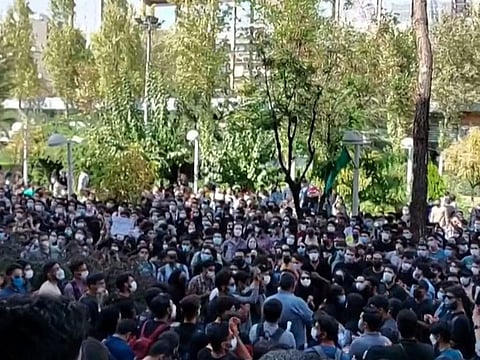Iran oil strikes spread as rights group warns over Kurdish city
Strikes at Abadan facility, oldest in Middle East, played key role in 1979 revolution

Tehran: Oil industry strikes in Iran spread to a major crude refinery in the southwest, according to videos posted on social media on Tuesday, as a rights group said a Kurdish city was under attack by security forces.
The latest industrial action comes as nationwide protests against the country’s leadership enter their fourth week despite state crackdowns. The authorities have labelled anyone involved as “enemies” and shown few signs of conceding to any of the protesters demands, which include an end to mandatory Islamic dress codes.
Unverified videos shared on Twitter on Tuesday showed dozens of petrochemical workers, some in uniforms, gathering outside buildings or staging demonstrations at the Abadan refinery in the oil-producing hub of Khuzestan.
The strikes appeared to take place at the phase two of Abadan refinery, which has major symbolic significance in Iran. Strikes at the facility, the oldest in the Middle East, played a crucial role in the 1979 revolution, helping to topple the Shah of Iran.
The apparent industrial action at Abadan follows Monday’s reports of strikes in Assaluyeh, which is east of Abadan on the Arabian Gulf, at a plant that processes gas from the giant South Pars field. None of the footage could be verified by Bloomberg News.
Abadan also holds historic significance because it was the focal point of Iran’s efforts to nationalise its oil industry in 1951, which culminated in the US and Britain staging a coup in 1953 to overthrow the country’s prime minister. In the 1980s it was frequently targeted by Iraqi forces during Saddam Hussain’s invasion of Iran.
In April, the National Iranian Oil Refining and Distribution Co. said Abadan’s phase two was undergoing a $1.26 billion renovation in order to “stabilise” crude refining capacity to 360,000 barrels a day. Efforts to modernise the aging facility and draw foreign investment have been hampered over the years partly because of sanctions.
It’s unclear whether those who were striking on Tuesday were contractors or permanent workers but the spread of the protests to Iran’s energy sector - a lifeline for the country’s heavily sanctioned economy - shows that the unrest is taking on wider national significance and may disrupt a critical part of the Islamic Republic’s heavy industry.
Elsewhere in Iran, in the Kurdistan province where Amini was from, protests have been particularly fervent. On Tuesday, the Oslo-based Hengaw Human Rights Organization said it had reports from the provincial capital Sanandaj of a “full on military attack” on the city, and that authorities had completely shut down the Internet in the area. None of the footage or reports can be verified by Bloomberg News.



